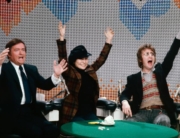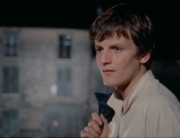Perhaps the most shocking thing about the Roger Ebert documentary Life Itself is the revelation that Ebert became a full-time paid film critic at a major newspaper in the third largest city in the United States as a 22- year-old who had been slaving away as an intern at the Chicago Sun-Times for weeks. He didn’t even apply for the job, but was handed it once the incumbent film critic retired. Even though he was the editor for his university newspaper, this is so utterly beyond the comprehension for any budding journalist under 30 in today’s media environment that the remainder of my viewing experience was spent feeling as if I was watching a strange alien from a distant galaxy.
More than once, an interviewee who knew Ebert well remarks that he really did see his life as a vast movie, of which he was the star and director, relegating everyone else to supporting roles. Life Itself was his chance to live that out in a literal way, to retroactively make his life a work of cinematic art spanning the decades. So every part of his life must be included, since the star is the de facto director of his own biopic, with special focus on the extreme physical circumstances of his final years, which the film devotes a considerable bulk of its long 118 minutes.
The film also deals with his colleague/rival Gene Siskel’s death from a brain tumor and the way that Siskel kept the illness secret, which inspired Ebert to do the opposite: to be as forthcoming about his own maladies as possible. He made absolutely sure to make good on that vow in this film.
At one point, he demands that a scene depicting how he ingests nutritional paste through a tube in his throat be included, since it’s not only the director Steve James’s movie but his as well, and not presenting the “full reality” would be unpardonable. Your enjoyment of the film will depend on how keen you are on seeing that aim fulfilled.
There are great stretches of documentary filmmaking. Interviews mix smoothly with rare photographs and well-chosen music to bring his bygone early days palpably to life. Accounts of Ebert’s hard-partying, boozy nights as a fixture at a swinging Chicago tavern are especially engaging, and there are plenty of times when the film sweeps you up completely, just as James’s terrific doc Hoop Dreams did. The sections covering Ebert’s working relationship with Siskel are consummately entertaining and hilarious as well, but the film loses much of the momentum with the constant switchbacks to Ebert in a hospital bed.
It seems like there is more than enough material to cover the Siskel and Ebert years to warrant its own film. The weirdness of their television show’s concept is easy to forget—it was presented like a sitcom where two cinephiles lived in a movie theater and convened weekly to talk about what they had seen. It was like an odd YouTube series, before the Internet even existed, and somehow became as mainstream American as apple pie.
To its credit, James addresses the perhaps dubious cultural influence of their ubiquitous, nuance-destroying appendage-based evaluation metric. We also get perspective on how the duo’s popularity led to its unavoidable absorption into multimillion dollar marketing campaigns, becoming the main mouthpiece of Hollywood advertising.
The best parts are the behind-the-scenes glimpses into the pair giving each other guff about their weight, speaking ability, intelligence, and anything else you can imagine, with a boxer’s speed and grace. They were like an old married couple who knew how to push the other’s buttons expertly, but there was an unmistakable respect and even fondness, without which their chemistry would not have popped. It’s worth seeing just for the inside looks at their show.
Roger Ebert lived an incredible life, filled with impressive accomplishments, and it would have been great if we could have spent more time on those. Capturing life itself seems to be a misguided artistic project, since life is largely dull and often hard to bear. This is what the movies are for, to weed out those parts and get to the cooler stuff.

















Leave A Comment